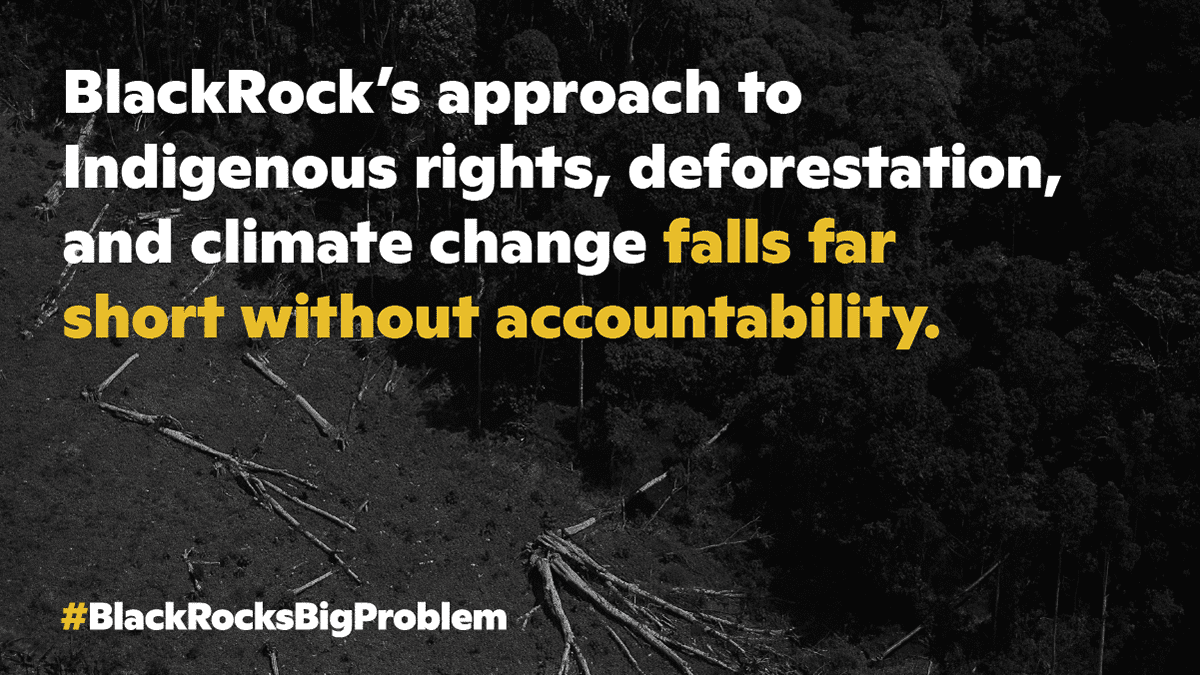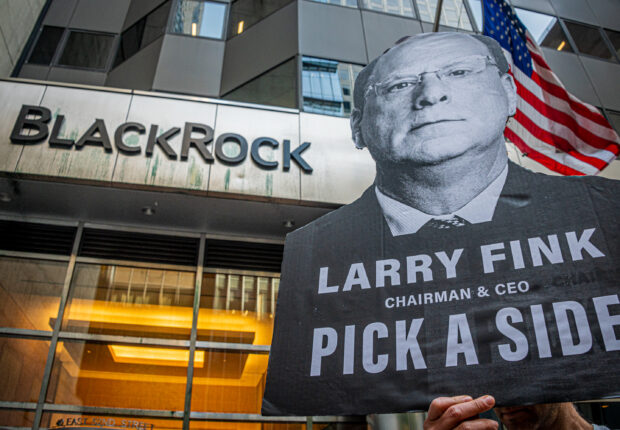On Thursday, March 18 the BlackRock Investment Stewardship (BIS) team released a commentaries on its approach to “natural capital” and human rights as well as 2021 engagement priorities. While there are some encouraging developments, BlackRock has yet to demonstrate the bold and visionary leadership necessary to match the scale of crises impacting communities and our environment worldwide.

This is an analysis of BlackRock’s “natural capital” commentary, human rights commentary, and relevant climate, human rights, and “natural capital” information given in its 2021 engagement priorities.
Notably, BlackRock directly acknowledges the interconnectedness of climate change, ecosystem protection, and Indigenous rights and the fact that corporate activities can harm all three – a first for the Big Three asset managers. However, BlackRock’s response to these crises is merely to request disclosures from companies on these issues. While disclosure of impacts can be useful for analyzing the scope of the problem, disclosures alone are insufficient to end the ongoing destruction of the world’s last standing forests, halt the epidemic of violence against Indigenous peoples and land defenders, or protect communities and ecosystems threatened by extractive industries and climate chaos.
In order to reduce client exposure to risk and the firm’s own complicity in the growing biodiversity, human rights, and climate crises around the world, BlackRock must communicate transparent expectations, timelines, and consequences for corporate inaction on these issues. As the BlackRock’s Big Problem campaign has recommended since June 2020, BlackRock should adopt a definitive no-deforestation and human rights policy with clear accountability mechanisms that result in concrete improvements for communities, ecosystems, and the planet.
We need visionary financial leadership to confront climate change, human rights abuses, and ecosystem destruction. BlackRock must take responsibility for the impacts of its investments with bold and immediate action that lowers global emissions, ends deforestation, protects ecosystems, and respects human rights, especially the land rights of Indigenous and traditional peoples.
(Note: quotes in this document come from one of the three BlackRock documents linked above.)
What we like (with some caveats)
- BlackRock recognizes the interconnectedness of climate change, ecosystem protection, and Indigenous rights, writing, “there is significant interconnectivity between various environmental and social factors,” and that a “changing climate impacts all aspects of the natural environment, society, and the economy globally.”
- BlackRock acknowledges that areas of high biodiversity tend to overlap with the territories of Indigenous and traditional peoples, and that their “livelihoods, languages, and traditions are dependent on that land and its species.” It also says companies should “obtain the free, prior, and informed consent (FPIC) of indigenous peoples for initiatives that affect their rights.” The use of the word “consent” (as opposed to “consultation”) is notable here, as some governments and countries attempt to promote the lesser standard of consultation.
- BlackRock recognizes the risks land conflicts and rights violations pose to company operations. It says it will examine whether companies obtain FPIC and provide access to remedy when rights are violated.
- BlackRock outlines an expectation that “companies with material dependencies or impacts on natural habitats should publish no-deforestation policies and strategies on biodiversity.” It’s important to note that while company policies of this nature can improve practices, they do not provide guarantees of positive impact; some of the companies responsible for widespread deforestation, critical habitat loss, and violations of communities’ rights have such policies yet continue to cause serious harm.
- BlackRock says it will ask all companies with material deforestation exposure to disclose a breakdown of every geographical location where the company is growing or sourcing agricultural commodities as a proportion of its total production/sourcing. This allows investors to understand how exposed a company is to high-risk areas.
- BlackRock notes that land-use change is the second largest cause of GHG emissions and that climate goals are not achievable “without curtailing deforestation and accelerating protection and restoration efforts.“
- BlackRock says it will ask companies for short, medium, and long term targets for reduction of impacts on “natural capital.” BlackRock should require short, medium, and long term targets from companies on all climate, environment, and social responsibility initiatives.
- BlackRock suggests it will vote against the re-election of members of corporate boards, when companies have not effectively addressed “natural capital-related risks” or “human rights-related risks or impacts.” BlackRock also implies it will vote for “relevant” shareholder proposals that address “natural capital” risks. BlackRock does not define “relevant,” raising questions about the robustness of this commitment.
What we have questions about
- Will all companies BlackRock invests in be asked to disclose on “natural capital” and human rights? If not, how will BlackRock decide which companies should provide these disclosures?
- What measures will BlackRock use to evaluate the adequacy of disclosures and demonstrations by companies that they are minimizing their impacts on the environment and communities?
- Beyond self-reported data and voluntary policy commitments, how will BlackRock conduct its own due diligence and monitoring to ensure companies are adhering to international human rights norms and industry best practices?
- Given the failure of voluntary corporate commitments and the weak nature of voluntary sustainability bodies, how will BlackRock take into account the experiences and knowledge of impacted communities, workers, and ground-truthed data?
- What mechanisms will BlackRock have in place to hold companies accountable for repeated environmental and human rights violations, including failure to uphold FPIC standards?
- How will BlackRock hold companies accountable for ongoing environmental and social violations on the ground, even if companies have no-deforestation and related policies and commitments?
- BlackRock states that “ideally” companies will demonstrate how they are “enhancing the stock of the natural capital,” but outlines no clear consequences for companies that do not do so. How will BlackRock hold companies accountable for not only minimizing risks to “natural capital” but also “enhancing” it? What consequences are/will be in place for companies that fail to take these crucial steps?
- BlackRock considers “breaches of international standards that may result in adverse human rights impacts and create material business risks” as one cause for engaging companies. Whether on human rights or “natural capital,” what happens when engagement fails to shift company behavior? This is not a theoretical question. Extractive industries have a flagrant history of human rights abuses. While BlackRock has engaged with agribusiness companies over the past several years, companies BlackRock invests in have continued to drive deforestation.
- BlackRock notes a need to transition to a “low-carbon economy.” Why isn’t the expectation a net-zero, or even zero-carbon, economy?
What is missing or problematic
- BlackRock has begun to acknowledge that its investments can harm people and ecosystems, as well as to corporate bottom lines. However, mostly what BlackRock proposes for addressing these harms is vague engagement with unnamed companies. Visionary financial leadership on climate change, human rights, and ecosystem destruction means taking responsibility for the impacts of one’s investments, and taking bold and immediate action that lowers global emissions, ends deforestation, protects ecosystems, and respects human rights, especially the land rights of Indigenous and traditional peoples.
- BlackRock refers to net zero GHG emissions by 2050 as a “global aspiration” rather than a necessity for planetary survival. BlackRock’s climate “Key Performance Indicator” in its 2021 engagement priorities misses the mark, yet again. BlackRock expects companies to align with a scenario well below 2℃ and to reach net zero GHG emissions by 2050. Why hasn’t and when will BlackRock demand a maximum increase of 1.5℃ and immediate GHG reductions, as science says is necessary?
- The reference to land, forests, water, air, and ecosystems as “natural capital” is concerning. These lifegiving resources are more than the “goods and services that support the current and future prosperity of an organization” and they are more than the carbon they store. Rather, “they are living, breathing ecosystems, cultural and spiritual sites, and life-giving for millions of people across the planet.”
- BlackRock outlines its approach on biodiversity preservation, deforestation, and freshwater and oceans protection, and while it notes the importance of air and air quality concerns from deforestation in the Amazon Basin, BlackRock fails to detail its company engagement on air pollution. BlackRock is among the world’s largest investors in fossil fuels and deforestation. An estimated 8 million people a year die from fine particulates (PM2.5) linked to fossil fuels. BlackRock giving corporate polluters a pass is literally a matter of life and death.
- BlackRock identifies risks and notes what information it will ask of companies, but it does not explain how it will comprehensively hold companies accountable. Increased disclosures from companies tied to some of the worst abuses in their respective sectors will not lead to tangible changes for communities on the front lines of deforestation, fossil fuel extraction, and grave human rights abuses.
- Land rights violations are rife in the agribusiness sector and are often accompanied by violence, murder, and criminaliation of local communities and land and environmental defenders. Yet these documents make no mention of violence against land and environment defenders or what BlackRock expects of companies complicit in such violence.
- While it’s positive that BlackRock urges companies to adhere to FPIC, it should make clear to companies that FPIC is a precursor for any operations on communities’ customary lands. It should make clear that if those rights are violated, BlackRock will hold companies accountable.
- BlackRock indicates that it will only devote attention to first and second tier supply chains. However, this leaves open a huge loophole for indirect suppliers. In Brazil, indirect suppliers are a significant driver of deforestation. This is also true for palm oil supply chains, where several of the companies BlackRock invests in exclusively source from indirect suppliers. For example, companies like Archer-Daniels Midland do not operate any of their own palm oil plantations in Indonesia and rely nearly exclusively on indirect suppliers. Analysis (and action) from BlackRock should take into account companies’ full supply chains.
- BlackRock notes that it “will continue to engage with palm oil producers, downstream buyers, and other relevant stakeholders to promote sustainable palm oil practices.” Agribusiness at large, and the palm oil industry specifically, pose heightened risks around issues of deforestation and human rights. Voluntary sustainability bodies like the RSPO have too often proven to be weak and ineffectual, and BlackRock should steer away from an over-reliance on these bodies in lieu of proper due diligence.
- BlackRock mentions the need to protect the world’s oceans and has an increased focus on plastic pollution, but recycling and switching to other throwaway materials (e.g., biodegradable plastics) will not solve the plastic pollution crisis. BlackRock must demand the elimination of single-use plastics and transition to systems of reuse. The APAC region is flooded with plastics because developed countries have exported their waste to developing countries. It is impossible to manage the surge of plastic production and pollution, so if BlackRock is serious about climate change and human rights, it will demand an end to single-use plastics.
- BlackRock speaks of a transition to a low-carbon economy and to innovation. However, innovation can take many shapes, and placing too much trust in technical fixes can come at the cost of engaging with local communities to explore and innovate in non-extractive and durable ways.
- According to “pathway 1” in the 2018 IPCC “Special Report on Global Warming of 1.5°C” (SR1.5).
- Quote is from BlackRock’s Natural Capital commentary, in a footnote quoting a definition by the International Integrated Reporting Council.

